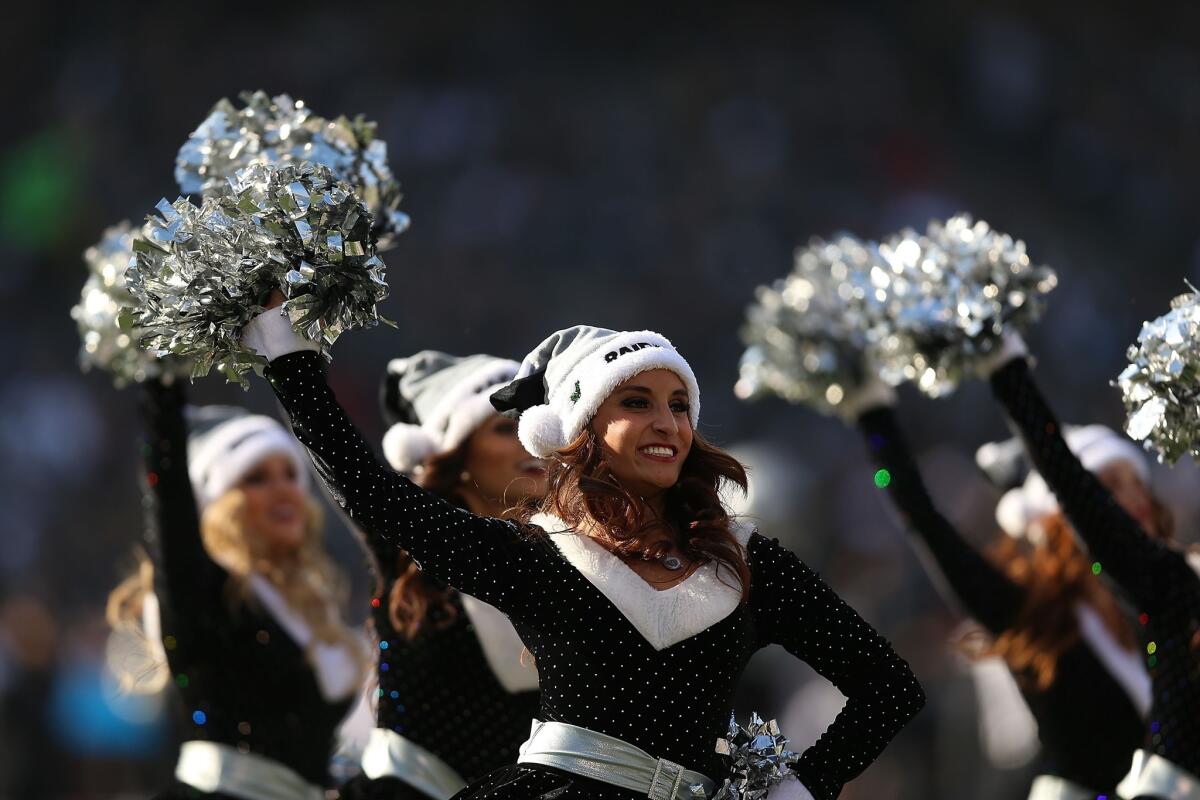What does Jamie Dimon have that Oakland’s Raiderettes don’t?

- Share via
Call it a tale of two sides of the capitalist system: JPMorgan Chase & Co.’s Jamie Dimon got $20 million for being CEO in 2013; each Oakland Raiderette got $1,250 for kicking up her heels in the same year.
The Raiderettes are suing; presumably, Dimon is smiling — all the way to the bank.
True, the Raiders had another lousy year in 2013, though I’m not sure how much blame can be put on the cheerleaders. But as Forbes’ Halah Touryalai wrote about our banker friend: “Despite what was arguably the bank’s worst year under Dimon’s reign, JPM’s board is awarding the CEO a 74% raise which includes over $18 million in restricted stock.”
Or, to quote a Raiderette: “Sis, boom, boooooooo.”
It isn’t fair. It isn’t right. Why does America have to be the land of the free and the home of the brave — and of the extravagantly paid and the vastly underpaid?
Well, here’s one reason — and no, my Republican friends, you aren’t going to like this: “The share of American workers belonging to labor unions held steady in 2013, remaining unchanged at 11.3%, the U.S. Bureau of Labor Statistics reported Friday.”
That’s right. Trash unions all you want, but here’s the bottom line, from The Times’ story: “The Bureau of Labor Statistics reported that among full-time workers, union members had higher median weekly earnings than non-union members. Union workers earned $950 per week, compared with $750 for those who don’t belong to labor groups.”
Which is still a far cry from Dimon’s lofty pay scale, but you get the idea.
Now, I know the argument: It’s a matter of supply and demand. Plenty of women can do what the Raiderettes do; only a select few (funny, it’s mostly men, huh?) can do what Dimon does.
Sorry, not good enough. There were plenty of slaves in the South once too; that didn’t make that particular labor model fair or right.
No. If American companies would just do right by their workers, we wouldn’t be having this discussion. Fast-food workers, Wal-Mart workers, farm workers: Examples abound of industries in which workers aren’t paid a living wage not because companies can’t afford to but because companies don’t have to.
It’s not a new story. It’s why unions were born. But as “union” has become a four-letter word to the movers and shakers of one of America’s major political parties, we’ve seen a steady erosion in membership — and the benefits unions bring to workers.
Call me naïve, call me crazy, call me — well, coming on the heels of his holiday, call me someone who believes as Martin Luther King Jr. did: “I have a dream” — that someday, all Americans will get paid not just what they’re worth but what they deserve.
It’s something we should all cheer for.
ALSO:
Iowa Rep. Steve King lays an egg on the farm bill
I can relate to Jahi McMath’s family because I’ve been there
San Francisco’s bus wars are a proxy fight against gentrification
Follow Paul Whitefield on Twitter @PaulWhitefield1 and Google +
More to Read
A cure for the common opinion
Get thought-provoking perspectives with our weekly newsletter.
You may occasionally receive promotional content from the Los Angeles Times.











